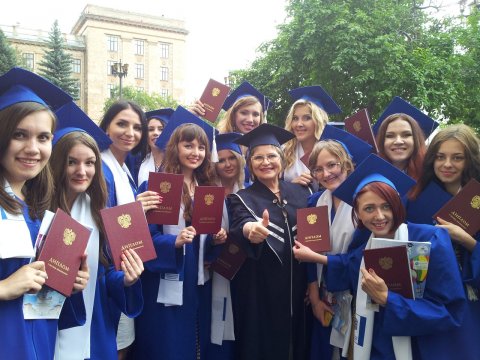Doctor of Sciences (Philology), Dean of the Faculty of Journalism, Head of the SUSU Department of Journalism and Mass Communications, famous journalist Lyudmila Shesterkina tells us about how many applicants enrolled in the Faculty of Journalism, and where graduates go to work after completing their degrees.
– Tell us please, have you had more or less applicants this year in the journalism group compared to last year?
– This year, we have had as many as last year. We are planning on opening two groups of 28 people each for journalism education in the intramural Bachelor’s program, one group for extramural, and, of course, we are accepting Master’s students in the Universal Journalism program. We have applicants who want to study specifically in the South Ural State University Faculty of Journalism. We are very happy about this.
– What tests have applicants gone through already?
– Our applicants had to pass tests related to a creative contest. It was held in three stages. This allows us to look at our applicants from all angles. The first, of course, important skill for applicants is to write texts. First of all, we asked them to write a small essay on what they think about the journalism profession today, and what the mission and purpose of modern journalism are. And we got some very interesting answers saying that professional journalism today is a guide for people in the vast sea of information. And this is a correct observation. The second creative task involved us wanting to get to know the applicants’ skills in working in television, radio, and on social networks. We were happy to see that our applicants are sociable, able to handle stress, friendly, look nice, speak well, and more.
.jpg)
– I know that there were no state scholarships this year, do you think this will affect admissions?
– Of course, we also wanted to have state scholarships for those who were accepted. But I think that choosing such a profession as journalism depends, first of all, on the state of the soul, and if a person feels that journalism is his/her calling, if s/he understands that this is his/her path, then s/he will look at their enrollment in university differently. First of all, applicants look at the place they’re learning their profession at. And they must, of course, choose a university which is ranked highly internationally and within Russia, which is well-known abroad, and the degrees of which are recognized around the world. South Ural State University is one of these universities. We are in the Top 1000 around the world – this is the international elite. We are one of the Top Ten best universities in Russia.
– And in terms of journalism, what is SUSU’s position?
– SUSU is in the European Journalism Training Association, which includes 70 leading journalism centers in Europe – there are only 4 Russian universities, including SUSU. The president of the European Journalism Training Association Niko Drok is a Professor Emeritus of the SUSU Faculty of Journalism. We have the chance to create journalism education at the European level and compare our rankings to the best international schools of journalism. In the new year, we are introducing a new project, and those who come to us to study will be part of a large, unique international project – Eucheck. Together with the Union of Journalists of the Chelyabinsk Oblast, we will study and practice fact checking. International partnership is a huge advantage at the SUSU faculty of journalism. And one more advantage is our materials and technology upon which we build our academic programs. Our university has absolutely all kinds of medialaboratories – the SUSU-TV telecompany, Radio SUSU studio, the Technopolis newspaper, and the Newsroom, which unites all forms of media. Our students learn the most breakthrough technologies and graduate as universal media specialists.
– Does the Department keep in touch with graduates?
– Of course. When we say goodbye to our graduates, I always say ‘Our relationship is just beginning’. They go to work for the media institutions that we work with, earn serious management positions, and become famous journalists. Our graduate Vladimir Artyukhov works in America in a Russian-language television studio in Miami, Vsevolod Chinilov – at a Moscow business radio station, Galina Fedorchenko has become an excellent reporter for the CTC television channel, and Olga Galeeva – a famous television presenter for Tyumen TV. Just recently, our graduate Evegny Dmitrenko took over leadership of Yuzhny Ural State Television and Radio Broadcasting Company. And we are very proud of our graduates. Their path towards this profession began before our eyes. Ancient wisdom says that “A journey of a thousand miles begins with the first step.” So, the first step should be a sure one, and if it’s done in the direction of journalism – it’s the correct choice.




